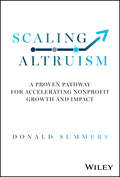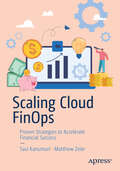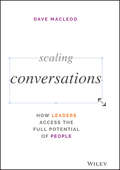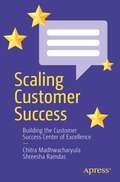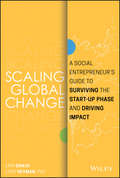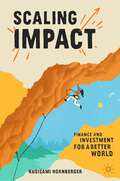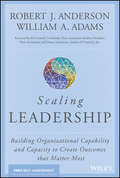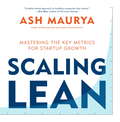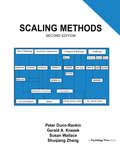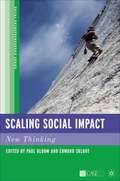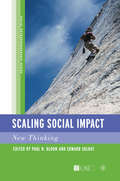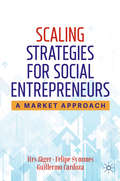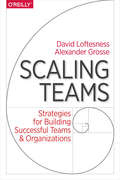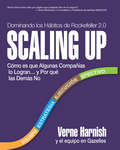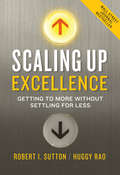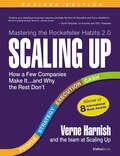- Table View
- List View
Scale: The Universal Laws of Life and Death in Organisms, Cities and Companies
by Geoffrey WestGeoffrey West's research centres on a quest to find unifying principles and patterns connecting everything, from cells and ecosystems to cities, social networks and businesses.'An absolutely riveting read . . . groundbreaking' Marcus du Sautoy'This book will expand your thinking from three dimensions to four' Nassim Nicholas Taleb'Scale is a firework display of popular science' Niall Ferguson'This is an important and original book, of immense scope' Lord Martin Rees, Astronomer RoyalScale addresses big, urgent questions about global sustainability, population explosion, urbanization, ageing, cancer, human lifespans and the increasing pace of life, but also encourages us to question the world around us. Why can we live for 120 years but not for a thousand? Why does the pace of life continually increase? Why do mice live for just two or three years and elephants for up to 75? Why do companies behave like mice, and are they all destined to die? Do cities, companies and human beings have natural, pre-determined lifespans? Are we just a fascinating experiment in natural selection that is ultimately doomed to fail? And what is the origin of the magic number 4 that seems to determine much of physiology and life-history from birth to death?Read by Bruce Mann(p) 2017 Penguin Random House
Scaling Agile with Jira Align: A Practical Guide To Strategically Scaling Agile Across Teams, Programs, And Portfolios In Enterprises
by Dean MacNeil Aslam CaderThis book is for portfolio managers, program managers, product managers, product owners, executives, release train engineers, and scrum masters who want to empower their teams to deliver the right things at the right time and quickly respond to changes in the market. Familiarity with Jira Software is necessary; the book will teach you the rest.
Scaling Altruism: A Proven Pathway for Accelerating Nonprofit Growth and Impact
by Donald SummersA hands-on toolkit for ambitious nonprofit leaders seeking to grow their organization's impact In Scaling Altruism: A Proven Pathway for Accelerating Nonprofit Growth and Impact, veteran social impact advisor and entrepreneur Donald Summers delivers a comprehensive, step-by-step blueprint to transforming small or mid-size nonprofit into an impactful and extraordinary agent of change. The book contains templates, tools, exercises, and crystal-clear implementation guides that readers can apply immediately to begin scaling their social impact organization. Offering actionable insights that have enabled many of today's most exciting social change efforts, the author provides practical guidance on how to turn your nonprofit into a social-problem-solving machine. You'll also find: Specific strategies to improve cash flow and funding to your nonprofit, including revenue tools and staff integration An Investment and Partnership Scorecard, detailing the health of your fundraising efforts Leadership best practices for dealing with disruptive people at a nonprofit An invaluable resource for managers and directors at small- to medium-sized nonprofits, Scaling Altruism is also perfect for funders and graduate students aspiring to work in the nonprofit space.
Scaling Cloud FinOps: Proven Strategies to Accelerate Financial Success
by Sasi Kanumuri Matthew ZeierResponding to the escalating demands placed on organizations and enterprises as they navigate the intricacies of cloud economics, this book offers pragmatic insights for establishing a sturdy foundation for cloud cost management. Scaling Cloud FinOps empowers you with the knowledge and strategies to harness efficient cloud technology usage to proficiently manage cloud costs, refine expenditure, and implement robust, scalable Cloud FinOps practices. At the same time, it arms engineering leaders and executives with the necessary tools to foster a culture of cost awareness critical to greater profitability. At the heart of the book lies author Sasi Kanumuri’s #Piggy-Bank Framework, an innovative approach to cloud cost governance that offers a practical blueprint to streamline cost reporting, provisioning, and resource management through automation, efficiency, and overall financial performance. You’ll also delve into the intricacies of the 6-factor formula, a proven approach to cloud cost management. From resource rightsizing and cost allocation models to automated guardrails and vendor management, each factor serves as a pillar to support your organization's financial goals. Looking beyond numbers, Scaling Cloud FinOps will give you the tools needed to orchestrate a cultural shift that can permeate every aspect of your organization. You'll learn how to cultivate a cost-aware engineering culture in which financial policies give every team member the knowledge and motivation to make data-driven decisions that drive efficiency, unlocking significant cost savings and cloud financial excellence. What You Will Learn Cultivate a culture of cost awareness and accountability within engineering teams, fostering collaboration and data-driven decision-making to enhance cloud efficiency Best practices from FinOps pioneers who've scaled world-class FinOps Teams at tech giants and startups Explore unique frameworks enriched with real-world case studies, providing invaluable insights into effective cloud cost management (CCM) Acquire expert techniques in cost optimization, automation, and vendor management, all proven to deliver significant savings and optimal efficacy Who This Book Is For Professionals and leaders across the cloud, IT, finance, and procurement industries interested in streamlining cloud expenditures, cultivating a culture of cost awareness across the organization, and establishing robust cloud cost management strategies. Whether you're a novice or seasoned in FinOps practices, this book equips you with the tools to maximize the business value of your cloud investments.
Scaling Conversations: How Leaders Access the Full Potential of People
by Dave MacLeodFind out what your customers and employees are really thinking with this indispensable resource Scaling Conversations: How Leaders Access the Full Potential of People delivers invaluable strategies for how leaders can make their communications more inclusive and access the voices of those employees who rarely feel empowered to speak up. As constituent numbers scale, leaders have traditionally struggled to make communications a conversation with the entire organization, settling instead for small focus groups, talking at people in town halls, and delivering surveys after the fact. The result is exclusive, narrow decision-making that disengages and under-utilizes talent and human capital. And now, as the remote environment grows, the challenge and imperative for engaging conversations on a wider scale is even greater. Scaling Conversations provides the solution. Having led a remote team for over a decade and having worked with thousands of leaders across North America, Dave MacLeod teaches you how to: Scale your business by listening to the voices that really matter Access and maximize the human capital in your organization Make decisions that create unity and move the group forward Decrease employee turnover caused by poor communication Within these pages, you'll learn how to better facilitate conversations with a wider and more representative array of clients and employees, and not just the loudest ones in the town hall meeting or Slack channel. Perfect for any leader who's responsible for understanding what employees are really feeling and thinking, Scaling Conversations also belongs on the bookshelves of anyone who wants to learn how to discover what the “silent majority,” who are often drowned out by the loudest people in the room, actually believes.
Scaling Customer Success: Building the Customer Success Center of Excellence
by Chitra Madhwacharyula Shreesha RamdasCustomer Success is a relatively a new discipline that focuses on maximizing customer business value and outcomes realization. Practitioners focus on customer adoption, customer experience and then positive correlation, organic growth and retention is achieved. This book will provide a practical guide for operationalizing the Customer Success function and methodologies. As we now step into the next phase of Customer Success, a phase of growth and standardization, it becomes important to start thinking about how to effectively scale this extremely important function. You'll see how to go from just offering a taste of Customer Success experience to your top customers, to offering it to all your customers, irrespective of their tier, spending, and current growth potential. As you expand the scope of Customer Success across all your customers, it becomes very important to understand how to operationalize Customer Success, how to convert the philosophies and ideas and best practices to usable operational models, and how to build a Customer Success Center of Excellence (CoE) focused on standardizing, scaling and expanding Customer Success practices and methodologies to optimize customer and company success and ROI. Scaling Customer Success will show you what kind of operational processes and workflows need to be put in place based on the stage of your company, products, customer engagement model and desired outcomes, what metrics are important to measure and how to capture those metrics. You'll also study what kinds of workflows to establish, how to effectively map and analyze results and most importantly, how to do Customer Success at scale effectively.What You'll Learn• Understand what a Customer Success Center of Excellence is• Establish a blueprint for how to scale and automate a Customer Success practice• Review information on key Customer Success metrics and workflowsWho This Book Is ForCompany leaders and customer success managers
Scaling Global Change: A Social Entrepreneur's Guide to Surviving the Start-up Phase and Driving Impact
by Erin Ganju Cory HeymanGrow your start-up into a global influence with real-world impact Scaling Global Change provides social entrepreneurs with the strong organizational foundation they need to change the world. Through the story of Room to Read, one of the fastest-growing nonprofits in the last 18 years, this book features clear, real-world lessons for growing a non-profit or social enterprise, with special insight into girls’ education and literacy programming in lower-income countries. By outlining theories of program, operational, and system-level change, the discussion delves into the meat of the entrepreneurial spirit and applies it directly to everyday strategic decisions. The book begins with an overview of essential communication, vision, and execution fundamentals, and then dives into a discussion of metrics, monitoring, planning, leadership, and more. Clear guidance on internal operations, fundraising, team building, management, and other central topics provides a roadmap for new and experienced leaders, while further exploration of influence, strategy, and government funding relates the wisdom of experience from the perspective of a successful organization. Cross the chasm from start-up to mature organization with worldwide impact Gain insight into the theoretical and practical underpinnings of nonprofit success Adopt new perspectives on effectiveness, excellence, and influence Translate ideas into action in a way that will change the world Social entrepreneurship has taken off more than ever, and the market is crowded with optimistic leaders wanting to change the world. How do you differentiate your organization from the pack? How can you stand out, stand up, and make a real impact? These lessons are gained through experience and building a strong organizational culture; Room to Read has treaded this path and found itself at the heights of success. With Scaling Global Change, you reap the benefit of experiential lessons while applying them to the success of your own organization. **All Royalties from the sale of Scaling Global Change will be donated directly to Room To Read**
Scaling Impact: Finance and Investment for a Better World
by Kusisami HornbergerThe global challenges confronting us — climate change, poverty, inequality, and many others — can feel overwhelming. Those of us who believe in market-based solutions to these challenges get even more disheartened when we regularly see our existing capitalist system failing us, often causing more harm than good. Many examples show how the capitalist tools of finance and investment can and make real, positive impact. Approaches like blended finance and impact investing can help accelerate progress against the world’s biggest remaining collective challenges. Yet use of these improved capitalist approaches remains far too subscale. Blended finance and impact investing remain 15 to 200 times smaller than traditional approaches to finance and investment. How can we continue to make capitalism work better by scaling these approaches and others? This book looks at how we can start making these necessary changes using strategies, structures, and practices that take advantage of capitalism's strengths. Its goal is to demonstrate how a reimagined financial system can be more inclusive and accountable to all. By shifting away from extractive, short-term practices in the name of shareholder primacy, we can move toward a system that values the role of all stakeholders.
Scaling Leadership: Building Organizational Capability and Capacity to Create Outcomes that Matter Most
by Robert J. Anderson Ed Catmull William A. AdamsTransform Your Organization by Scaling Leadership How do senior leaders, in their own words, describe the most effective leaders—the ones that get results, grow the business, enhance the culture and leave in their wake a trail of other really effective leaders? Conversely, how do senior leaders describe the kind of leader that undercuts the organization’s capacity and capability to create its future? This book, based on groundbreaking research, shows how senior leaders describe and develop leadership that works, that does not, that scales, and that limits scale. Is your leadership built for scale as you advance in today’s volatile, uncertain, dynamic, and disruptive business environment? This context puts a premium on a very particular kind of leadership—High-Creative leadership capable of rapidly growing the organization while simultaneously transforming it into more agile, innovative, adaptive and engaging workplace. The research presented in this book suggests that senior leaders can describe the High-Creative leadership with surprising clarity. They also describe with equal precision the High-Reactive leadership that cancels itself out and seriously limits scale. Which type of leader are you? You scale your leadership by increasing the multiple on your leadership in three ways. First, by developing the strengths that differentiate the most effective leaders from the strengths deployed by the most Reactive and ineffective leaders. And second, by increasing your leadership ratio—the ratio of most the effective strengths to the most damaging liabilities. Third, by developing High-Creative leaders all around you. Scaling Leadership provides a proven framework for magnifying agile and scalable leadership in your organization. Scalable leadership drives forward-momentum by multiplying high-achieving leaders at scale so that growth, productivity and innovation increase exponentially. Creative leaders multiply their strengths beyond technical competence by leading in deep relationship, with radical humanity, passion and integrity. Drawing upon decades of solid research and experience enhancing individual capability and collective leadership effectiveness with Fortune 500 companies and government agencies, the authors provide an innovative and efficient framework to help you: Take stock of your own personal balance of leadership strengths and weaknesses Scale your leadership in deep relationship and high integrity Proliferate high-achievers throughout your organization’s leadership system Identify ineffective leadership and course-correct quickly Transform your organization by transforming leadership Scaling Leadership is an invaluable tool for executives, managers, and leaders in business, academia, nonprofit organizations, and more. This innovative resource provides effective techniques, real-world examples, and expert guidance for organizations seeking to improve performance, align and execute strategies, and transform their business with scalable leadership capability.
Scaling Lean: Mastering the Key Metrics for Startup Growth
by Ash MauryaIs your "big idea" worth pursuing? What if you could test your business model earlier in the process--before you've expended valuable time and resources? You've talked to customers. You've identified problems that need solving, and maybe even built a minimum viable product. But now there's a second bridge to cross. How do you tell whether your idea represents a viable business? Do you really have to go through the whole cycle of development, failure, iteration, tweak, repeat? Scaling Lean offers an invaluable blueprint for modeling startup success. You'll learn the essential metrics that measure the output of a working business model, give you the pulse of your company, communicate its health to investors, and enable you to make precise interventions when things go wrong. You'll also learn how to: · ballpark the viability of a business model using a simple five-minute back-of-the-envelope estimation. · stop using current revenue as a measure of progress (it forces you to fly blind and, often, to overpromise to your shareholders) and instead embrace the metric of traction--which helps you identify the leading indicators for future business model growth. · set progressive goals that set you up for exponential long-term success by implementing a staged 10X rollout strategy, like one employed by Facebook and Tesla. · stop burying your breakthrough insights in failed experiments, but rather illuminate them using two-week LEAN sprints to quickly source, rank, and test ideas. Ash Maurya, a serial entrepreneur and author of the startup cult classic Running Lean, pairs real-world examples of startups like Airbnb and Hubspot with techniques from the manufacturing world in this tactical handbook for scaling with maximum efficiency and efficacy. This is vital reading for any startup founder graduating from the incubator stage.From the Hardcover edition.
Scaling Methods
by Peter Dunn-Rankin Gerald A. Knezek Susan R. Wallace Shuqiang ZhangScaling Methods is written for professionals in the behavioral sciences who analyze data that results from subjective responses. Other books on scaling attitudes or measuring perceptions focus on the psychometrician's view of measurement. This book focuses on the users' view by concentrating on effective ways to analyze data rather than the mathematical details of how each program works. The methods included handle the majority of data analysis problems encountered and are accompanied by a software solution. Each chapter features the theory surrounding that methodology, an example, a real-world application, and a computer solution.This book introduces the major uni- and multi-dimensional scaling method techniques most common in educational, social, and psychological research. Using four primary methods of data collection--ordering, categorical rating, free clustering, and similarity judgments--Scaling Methods, Second Edition explains how such data can be represented in ways that illustrate relationships among the data and help reveal underlying dimensional structures. Each method serves as an independent unit so readers can pick and choose from a variety of easy-to-use procedures and more advanced techniques. The new edition features a new chapter on order analysis and downloadable resources that provide stand-alone, as well as SAS supported demonstrations of multi-dimensional scaling techniques, plus programs to get raw data into matrix form. The text is written for researchers, practitioners, and advanced students in education and the social and behavioral sciences interested in analyzing data resulting from subjective responses, especially in the measurement of attitudes. Each chapter is self-contained making this an excellent resource for use in the classroom or as a self-study tool. A first course in statistics is a helpful prerequisite.
Scaling Migrant Worker Rights: How Advocates Collaborate and Contest State Power
by Shannon GleesonA free ebook version of this title is available through Luminos, University of California Press’s Open Access publishing program. Visit www.luminosoa.org to learn more. As international migration continues to rise, sending states play an integral part in "managing" their diasporas, in some cases even stepping in to protect their citizens' labor and human rights in receiving states. At the same time, meso-level institutions—including labor unions, worker centers, legal aid groups, and other immigrant advocates—are among the most visible actors holding governments of immigrant destinations accountable at the local level. The potential for a functional immigrant worker rights regime, therefore, advocates to imagine a portable, universal system of justice and human rights, while simultaneously leaning on the bureaucratic minutiae of local enforcement. Taking Mexico and the United States as entry points, Scaling Migrant Worker Rights analyzes how an array of organizations put tactical pressure on government bureaucracies to holistically defend migrant rights. The result is a nuanced, multilayered picture of the impediments to and potential realization of migrant worker rights.
Scaling Social Impact: New Thinking
by Paul N. Bloom Edward SklootMany social entrepreneurs struggle to take successful, innovative programs that address social problems on a local or limited basis and scale them up to expand their impact in a more widespread, deeper, and efficient way. In Scaling Social Impact , the editors address this issue with a comprehensive collection of original papers.
Scaling Social Impact: New Thinking (Social Entrepreneurship Series)
by P. Bloom E. SklootMany social entrepreneurs struggle to take successful, innovative programs that address social problems on a local or limited basis and scale them up to expand their impact in a more widespread, deeper, and efficient way. In Scaling Social Impact , the editors address this issue with a comprehensive collection of original papers.
Scaling Solutions: Leading Sustainable and Scalable Change
by John Elkington Pamela HartiganIn order to tackle the great challenges of achieving sustainable development, we need to learn how to scale and replicate the more sustainable solutions and mobilize collective effort in ways rarely seen outside of wars and space races. This chapter sounds the alarm for companies to plug into the ideas and actions of social and environmental entrepreneurs as they start to develop their own scale-up plans.
Scaling Strategies for Social Entrepreneurs: A Market Approach
by Urs Jäger Felipe Symmes Guillermo CardozaSocial entrepreneurs often experience difficulties when attempting to scale. The reason for this is that scaling isn’t just about an entrepreneur’s willingness to grow, but also—and, perhaps, even more importantly—his or her capacity to develop a scaling strategy that reflects an understanding of the various components that must be adjusted to accomplish scaling goals. Once entrepreneurs decided to scale the impact of their enterprise, they must develop new capabilities in order to access new resources and skills.This book will help social entrepreneurs create effective scaling strategies by providing a detailed, three-phased market approach to scaling. Cases based on social entrepreneurs who have successfully worked in low-income markets in Latin America then illustrate three main strategies for scaling impact: co-creating in low income contexts, collective impact, and replicating business models. The market approach to scaling described in this book is based on the theory of negotiating impact for resources, as introduced in this book, and a corresponding study of more than 100 entrepreneurs in the Latin American region. By offering a conceptual three phased approach as a guide for reflecting on practical case studies, this book appeals to business academics, leaders of incubators and those working with social entrepreneurs as well as current and aspiring social entrepreneurs themselves seeking to improve their management practices in order to scale their impact.
Scaling Swagbucks (A)
by Matthew Preble Jeffrey RayportIn mid-2014, Chuck Davis, chairman and CEO of Prodege LLC, parent company of the brand promotion business Swagbucks, is just a few weeks into his new role as the company's CEO. He has been tasked with helping the promising young company scale, something he has done successfully during prior stints as CEO at other young companies, but this situation presents him with some unique challenges. Prodege has a strong culture built around the deeply held religious beliefs of the company's founding employees, many of whom are devout ultra-Orthodox Hasidic Jews. This has resulted in some unique situations for a growing technology company, such as the company closing its office on Jewish holidays and for Shabbat. Davis is keen to quickly implement the changes that he believes need to be made for the company to grow, but he also recognizes the need to be careful not to upset the company's culture and potentially upset what had made the business special in the first place. How quickly should he move and how should he stage his actions?
Scaling Swagbucks (B)
by Matthew Preble Jeffrey Rayport"Swagbucks (B)," HBS No. 817123, picks up in mid-2014 following the events described in "Swagbucks (A)," HBS No 817122. Davis and Gorowitz were successful in their efforts to position the company for scale without negatively affecting the company's foundational culture, and developed a close working relationship. In early 2016, the company now has the opportunity to acquire MyPoints, an established competitor with millions of members and the chance to grow revenues at an even faster pace, but Davis and Gorowitz want to first discuss whether the company is strong enough to incorporate the new business and its employees.
Scaling Teams: Strategies for Building Successful Teams and Organizations
by Alexander Grosse David LoftesnessLeading a fast-growing team is a uniquely challenging experience. Startups with a hot product often double or triple in size quickly—a recipe for chaos if company leaders aren’t prepared for the pitfalls of hyper-growth. If you’re leading a startup or a new team between 10 and 150 people, this guide provides a practical approach to managing your way through these challenges.Each section covers essential strategies and tactics for managing growth, starting with a single team and exploring typical scaling points as the team grows in size and complexity. The book also provides many examples and lessons learned, based on the authors’ experience and interviews with industry leaders.Learn how to make the most of:Hiring: Learn a scalable hiring process for growing your teamPeople management: Use 1-on-1 mentorship, dispute resolution, and other techniques to ensure your team is happy and productiveOrganization: Motivate employees by applying five organizational design principlesCulture: Build a culture that can evolve as you grow, while remaining connected to the team’s core valuesCommunication: Ensure that important information—and only the important stuff—gets through
Scaling Up (Dominando los Hábitos de Rockefeller 2.0): Cómo es que Algunas Compañías lo Logran…y Por qué las Demás No
by Verne HarnishHa pasado más de una década desde que fue lanzado por primera vez el Best Seller Dominando los Hábitos de Rockefeller escrito por Verne Harnish. Scaling Up: Cómo es que Algunas Compañías lo Logran… y Por qué las Demás No es la primera revisión importante de éste clásico de los negocios. En Scaling Up, Harnish y su equipo comparten herramientas prácticas y técnicas para establecer un negocio o industria dominante. Estos enfoques se han afinado por más de tres décadas de asesoramiento de miles de CEOs y ejecutivos para ayudarles a navegar la complejidad (y peso) cada vez mayor que trae consigo la expansión de un emprendimiento. Este libro está escrito para que todos – desde empleados de primera línea hasta ejecutivos senior – puedan alinearse y contribuir al crecimiento de la firma. No hay razón para hacerlo solo, sin embargo muchos líderes sienten que ellos son los que arrastran al resto de la organización sobre la curva-S de crecimiento. El objetivo de este libro es ayudarle a convertir lo que siente como un ancla en un viento a favor– creando una compañía donde el equipo esté comprometido, los clientes estén haciendo su marketing; y todos hagan dinero. Para lograr esto, Scaling Up se enfoca en las cuatros principales áreas de decisión que cada empresa debe tener: Equipo, Estrategia, Ejecución y Efectivo. El libro incluye una nueva serie de Herramientas de una página incluyendo la actualización del Plan Estratégico en Una Página y una lista de control de Los Hábitos de Rockefeller, la cuál han utilizado más de 40,000 empresas alrededor del mundo para la expansión exitosa de sus compañías – muchos a $1 billón de dólares y más allá. Un negocio es en última instancia sobre la libertad. Scaling Up le muestra a los dueños cómo alcanzar la libertad sin importar cuán grande crece su negocio.
Scaling Up Compensation: 5 Design Principles for Turning Your Largest Expense into a Strategic Advantage
by Verne Harnish Sebastian Ross"I gave a star performer a raise, and now everyone else is marching into my office, demanding one, too." "If anyone looked closely at our payroll, it would be hard to rationalize why we're paying certain people what we do." "I'm tired of losing our best people to the Googles of the world because we can't match their salaries." "It seems like our bonus plans have become entitlements – like we're just giving money away." These and many more challenges arise when setting up compensation schemes. And given that compensation is one of your largest expenses, it's critical to get it right and then out of sight -- and turn it into a strategic advantage in attracting, retaining, and motivating talent (or not accidentally demotivating them). This book details 5 design principles along with practical examples of compensation schemes from leading small, medium, and large firms.
Scaling Up Excellence: Getting to More Without Settling for Less
by Robert I. Sutton Huggy RaoIn Scaling Up Excellence, bestselling author Robert Sutton and Stanford colleague Huggy Rao tackle a challenge that determines every organization's success: scaling up farther, faster, and more effectively as a program or an organization creates a larger footprint. Sutton and Rao have devoted much of the last decade to uncovering what it takes to build and uncover pockets of exemplary performance, to help spread them, and to keep recharging organizations with ever better work practices. Drawing on inside accounts and case studies and academic research from a wealth of industries - including start-ups, pharmaceuticals, airlines, retail, financial services, high-tech, education, non-profits, government, and healthcare -- Sutton and Rao identify the key scaling challenges that confront every organization. They tackle the difficult trade-offs that organizations must make between "Buddhism" versus "Catholicism" -- whether to encourage individualized approaches tailored to local needs or to replicate the same practices and customs as an organization or program expands. They reveal how the best leaders and teams develop, spread, and instill the right mindsets in their people -- rather than ruining or watering down the very things that have fueled successful growth in the past. They unpack the principles that help to cascade excellence throughout an organization, as well as show how to eliminate destructive beliefs and behaviors that will hold them back. Scaling Up Excellence is the first major business book devoted to this universal and vexing challenge. It is destined to become the standard bearer in the field.
Scaling Up Nutrition: What Will It Cost?
by Christine Mcdonald Susan Horton Ajay Mahal Meera Shekar Jana Krystene BrooksAction against malnutrition is needed more than ever. An additional US$10.3 billion a year is required from national and international public resources to successfully attack undernutrition worldwide. This would benefit more than 360 million children in the 36 countries with the highest burden of undernutrition--home to 90 percent of the stunted children globally. Since early childhood offers a special window of opportunity to improve nutrition, the bulk of the investment needs to be targeted between pre-pregnancy until two years of age. 'Scaling Up Nutrition: What Will It Cost?' notes that investment will yield high returns through thriving children, healthier families, and more productive workers. This investment is essential to make progress on the nutrition and child mortality Millennium Development Goals and to protect critical human capital in developing economies. The human and financial costs of further neglect will be high. This call for greater investment in nutrition comes at a time when global efforts to strengthen health systems provide a unique opportunity to scale up integrated packages of health and nutrition interventions with common delivery platforms, thereby reducing costs. 'Scaling Up Nutrition: What Will It Cost?' has benefited from the expertise of many international agencies, nongovernmental organizations, and research institutions. This book will be of interest to policy makers, public health officials, nutritionists, government officials, and all those interested in improving child nutrition and health outcomes.
Scaling Up: How a Few Companies Make It...and Why the Rest Don't (Rockefeller Habits 2.0)
by Verne HarnishWinner of the International Book Awards for General BusinessWinner of the Readers' Favorite International Book Award for Non-Fiction BusinessIt's been over a decade since Verne Harnish's best-selling book Mastering the Rockefeller Habits was first released. Scaling Up (Rockefeller Habits 2.0) is the first major revision of this business classic which details practical tools and techniques for building an industry-dominating business. This book is written so everyone — from frontline employees to senior executives — can get aligned in contributing to the growth of a firm. Scaling Up focuses on the four major decision areas every company must get right: People, Strategy, Execution, and Cash. The book includes a series of new one-page tools including the updated One-Page Strategic Plan and the Rockefeller Habits ChecklistTM, which more than 40,000 firms around the globe have used to scale their companies successfully — many to $10 million, $100 million, and $1 billion and beyond – while enjoying the climb!
Scaling Well by Doing Good: Motivating Talent at b.good
by Francesca Gino Bradley R. Staats Paul GreenBoston-based fast-casual chain, b.good, was founded on the idea of healthy food, sourced locally, and prepared in-store. They'd worked to build a value-based business, and worked hard to cultivate a sense of family--among employees, customers and suppliers. In 2015, they had entered a period of substantial growth, with the company doubling in size over the past 12 months, and plans to double again over the coming twelve months. The management felt this purpose and sense of family had served them well, but were worried that growth would water down these key ingredients to their success. As they enter 2016, they are particularly focused on ensuring that they get the "people" systems right.


